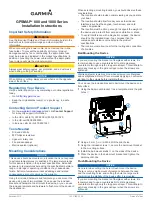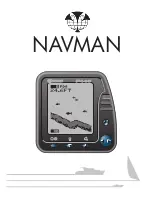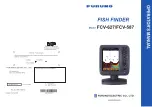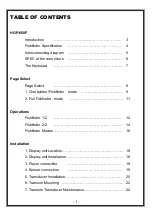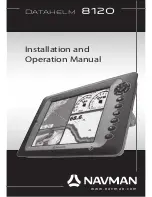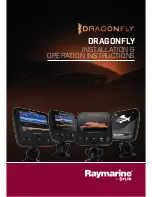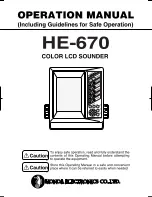
• When connecting NMEA 0183 devices with two transmitting
and two receiving wires, it is not necessary for the NMEA
2000
®
bus and the NMEA 0183 device to connect to a
common ground.
• When connecting a NMEA 0183 device with only one
transmitting (Tx) wire or with only one receiving (Rx) wire,
the NMEA 2000 bus and the NMEA 0183 device must be
connected to a common ground.
NMEA 0183 Connection Diagram
+
-
Item
Description
À
12 Vdc power source
Á
Wiring harness
Â
NMEA 0183-compliant device
Item Garmin Wire
Function
Garmin Wire
Color
NMEA 0183 Device Wire
Function
Ê
Power
Red
Power
Ë
Ground
Black
Data ground
Ì
Tx
Blue
Rx/A (+)
Í
Rx
Brown
Tx/A (+)
Lamp or Horn Connections
The device can be used with a lamp, a horn, or both, to sound
or flash an alert when the chartplotter displays a message. This
is optional, and the alarm wire is not necessary for the device to
function normally. When connecting the device to a lamp or
horn, observe these considerations.
• The alarm circuit switches to a low-voltage state when the
alarm sounds.
• The maximum current is 100 mA, and a relay is needed to
limit the current from the chartplotter to 100 mA.
• To manually toggle visual and audible alerts, you can install
single-pole, single-throw switches.
Item Description
À
Power source
Á
Power cable
Â
Horn
Ã
Lamp
Ä
Relay (100 mA coil current)
Å
Toggle switches to enable and disable lamp or horn alerts
Item
Wire Color
Wire Function
Ê
Red
Power
Ë
Black
Ground
Ì
Yellow
Alarm
Connecting the Device to a Transducer
Devices that can receive depth information from a Garmin
transducer have a port labeled SONAR. Go to
or contact your local Garmin dealer to determine the appropriate
type of transducer for your needs.
1
Follow the instructions provided with your transducer to
install it on your boat correctly.
2
Route the transducer cable to the back of your device, away
from sources of electrical interference.
3
Connect the transducer cable to the SONAR port on your
device.
Connecting the Device to an External Garmin
Sounder Module
Devices that can receive information from an external Garmin
sounder module have a port labeled ETHERNET. Go to
or contact your local Garmin dealer to
determine the appropriate type of sonar device for your needs.
1
Follow the instructions provided with your sounder module to
install it on your boat correctly.
2
Route the Garmin Marine Network cable from the sounder
module to the back of your device, away from sources of
electrical interference.
3
Connect the Garmin Marine Network cable to the
ETHERNET port on your device.
Connecting the Device to a Garmin Marine Radar
Devices that can receive information from a Garmin radar have
a port labeled ETHERNET. Go to
or contact
your local Garmin dealer to determine the appropriate type of
radar for your needs.
1
Follow the instructions provided with your Garmin radar to
install it on your boat correctly.
2
Route the Garmin Marine Network cable from the radar to
the back of your device, away from sources of electrical
interference.
3
Connect the Garmin Marine Network cable to the
ETHERNET port on your device.
Radar, Sonar, and Map Sharing Considerations
Devices that can share supplemental map information and view
data from a single radar or sonar module at the same time have
a port labeled ETHERNET. Go to
or contact
your local Garmin dealer to determine the appropriate type of
devices for your needs.
When connecting this device to compatible ETHERNET
devices, you should observe these considerations.
• This device is compatible only with other Garmin
ETHERNET devices, and does not share data with Garmin
Marine Network devices such as a GPSMAP 8000 series
device.
• This device is not compatible with legacy Garmin sounder
modules such as the GSD™ 26.
• If your device receives sonar data from a transducer
connected to the SONAR port, it does not share the sonar
data with other ETHERNET devices.
• A Garmin Marine Network cable must be used for all
ETHERNET connections.
◦ Third-party CAT5 cable and RJ45 connectors must not be
used for ETHERNET connections.
◦ Additional Garmin Marine Network cables and connectors
are available from your Garmin dealer.
• If this device has a single ETHERNET port, you may need to
use a Garmin network switch, such as a GMS™ 10 to
connect a radar or sounder module to more than one
ETHERNET device.
• If this device has both a RADAR port and an ETHERNET
port, you can connect an ETHERNET device to either port.
• Some sounder modules, such as the GCV™ 10 have more
than one ETHERNET port, and can connect to multiple
ETHERNET devices without an additional network switch.
3

